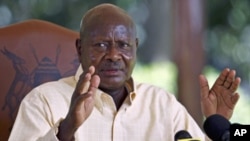Uganda's government has taken swift measures this month to thwart a resurgence of the so-called Walk to Work protest movement. The demonstrations have grown out of the frustrations some Ugandans feel about official fraud and mismanagement. The protests have led some to wonder whether Uganda could be the next African country to see its long-time ruler leave power.
As the eyes of the world were focused on the hunt for Gadhafi and liberation in Libya last week, Ugandans were worried about their own attempts at change. Governed by a president whose rule has spanned 25 years, many people here in Uganda are tired of corruption and rampant inflation.
The Walk to Work protest movement is meant to send a strong message to their President Yoweri Museveni - who since 2006 has won two multi-party elections - that enough is enough.
Movement kept down
Walk to Work encouraged people to leave their vehicles at home and walk, in protest against the rising cost of fuel. The protests were meant to be peaceful, but the outcome was anything but.
It began last April, when massive demonstrations turned violent and nine people were killed. This time, demonstrators on October 17 were met by tear gas and police batons, and a number of organizers were placed under house arrest or imprisoned on charges of treason. By the end of the week, with its leaders out of circulation, the movement had largely fizzled out. A rally planned for Saturday the 22nd, did not happen at all.
As political analyst Nicholas Sengoba explains, the government’s reaction was strategic.
“The government has taken lessons from May and April. They have stopped the main attraction points - that is the leaders - from either moving from their homes, or curtailed their freedom of movement. It is very difficult for people to organize when the leaders are incapacitated or immobilized,” said Sengoba.
Sidelining protest leaders
President Museveni has not publicly commented on the protest from last week. But police have. They say Saturday's rally was not allowed because the protesters failed to get proper permission. Prior to that, police have accused the protesters of disturbing the peace and some of attempting to overthrow the government by force.
Opposition leader Kizza Besigye was placed under house arrest last week to prevent him from walking to work. He says he does hope to create the sort of mass movement that drove dictators in Egypt, Tunisia and Libya from power.
“They may deprive me of my freedoms temporarily, but eventually we shall, I am sure, overcome this dictatorship, as indeed our fellow Africans are doing in other parts of the continent,” said Besigye.
Public discontent still simmers in Uganda. The country’s inflation rate climbed to more than 28 percent in September - the highest level in nearly two decades - making it difficult for many ordinary Ugandans to make ends meet. The country has also been rocked this month by several high-profile corruption cases, some involving the oil recently discovered in the west of the country.
Michael Mabike, head of the opposition Social Democratic Party, said the state has enjoyed an unfair monopoly of Uganda’s wealth.
“We believe that we’ve got sufficient resources to manage this country. But unfortunately, you are finding a handful of people benefiting more than the majority. Whoever has been able to make money in the last 25 years is in one way or another connected to the state or to the government,” said Mabike.
With long-serving leaders toppling across North Africa, many people are wondering whether Museveni could be the next to fall. Mabike said he thinks what happened in Tunisia, Egypt and Libya this year is the main reason why the Ugandan government acted so swiftly to silence last week’s protesters.
“Given what’s happening in the Arab world, the [Ugandan] government is panicking. The government is not taking any chance. That is why you are seeing that they are using Draconian measures to curb and crush any possible rebellion,” said Mabike.
But there are important distinctions between Uganda and what has happened in North Africa. Unlike the long time leaders of Libya, Tunisia and Egypt, Museveni can claim a democratic mandate from his people. And political analyst Nicholas Sengoba also argues Walk to Work has failed to generate the kind of popular momentum seen in North Africa. Conditions in Uganda are different than they are in North Africa, and real change will have to come from the ruling party itself, he said.
“The organization of the Arab Spring was not by politicians, but by civil society and individuals and people from within the middle class, the educated, the intelligentsia. Here, the mobilization is mainly by politicians, and they are not such a critical mass to create such a massive movement," said Sengoba. "My gut feeling is really that if there is ever going to be a change in Uganda, it is going to be from within the ruling party. They came on the wave of a revolution, and revolutions, as you know, get to a time when they eat their own children [consume themselves].”
Civil strife
Still, last week’s arrests of activists were enough to make many Ugandans nervous. Some, like this woman from Kampala, are concerned what will happen in case of a stand-off between supporters of opposition leader and one-time presidential candidate Kizza Besigye and the Museveni government.
“Of course Besigye has also people who support him. There are so many people that support him. So with time they are going to riot. So it will eventually result into a war. I’m afraid of this,” said the woman.
There appear to be no more Walk to Work protests planned in the coming days with several organizers still in prison. But, for his part, Besigye vows to continue walking to work in the hope that people will join him.





